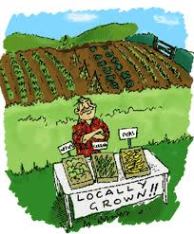Photo from suschool.org.uk
On Friday May 10th, Chatham University’s Center for Entrepreneurship held their monthly installment of the breakfast series. This installment focused on the food, the business of it, and its sustainability. Three women spoke at the event, which included Josephine Oria, Alice Julier, and Jennifer Flanagan. Oria is the CEO of La Dorita, a company that sells its own homemade dulce de leche and other products. Julier is one of Chatham’s own, a professor in the Master’s food studies program. Last but not least, Flanagan is the founder of Springboard Kitchens, an organization that trains people coming out of the jail system to work in the food industry. These fascinating women spoke about their work and the role sustainability plays in it.
Oria is a proud believer in sustainability and using local. All of the supplies for the dulce de leche are from local farms, except the Madagascar vanilla beans. She started her business by selling her product to the local farmer’s markets where Wholefoods later picked it up. The recipe uses raw, unpasteurized milk from Le’ara Farms. Oria stated that it is very difficult to buy raw milk, and a contract with the farm is required. The jars used for the dulce de leche are also local and come from Pennsylvania. Her company also has an incubator kitchen for up and coming food businesses. People can sign a two-month contract that allows them to use the space to start up their business.
According to Alice Julier, the school of sustainability at Chatham was built around the food studies program, as it encompasses the same values. She believes that the food system could work much better. What we do with food impacts the larger environment. How we think locally and globally about the world can affect what we do. Sustainable agriculture is a field that is dominated by women. Julier is confident that students in the food studies programs will do great things because they are interested and eager to learn.
The last speaker, Jennifer Flanagan, has a unique perspective on the subject of sustainable uses of food. While Springboard Kitchens trains people to work in the food industry, the company also makes meals for businesses and schools looking for fresh meals. They make over 2,000 meals a day for food insecure areas. Each month, over 20,000 pounds of fresh food is used. The company takes food that is at the end of its shelf life and stabilizes it to use in their meals. It receives money through foundations and grants, but is 90% self-sustaining when it comes to budget.
These amazing women are making a difference in the corporate, educational, and community worlds through sustainability and food. They are beacons for future developments in sustainable food and serve as successful models for those who aspire to work in the food industry, or simply have a love for food!
